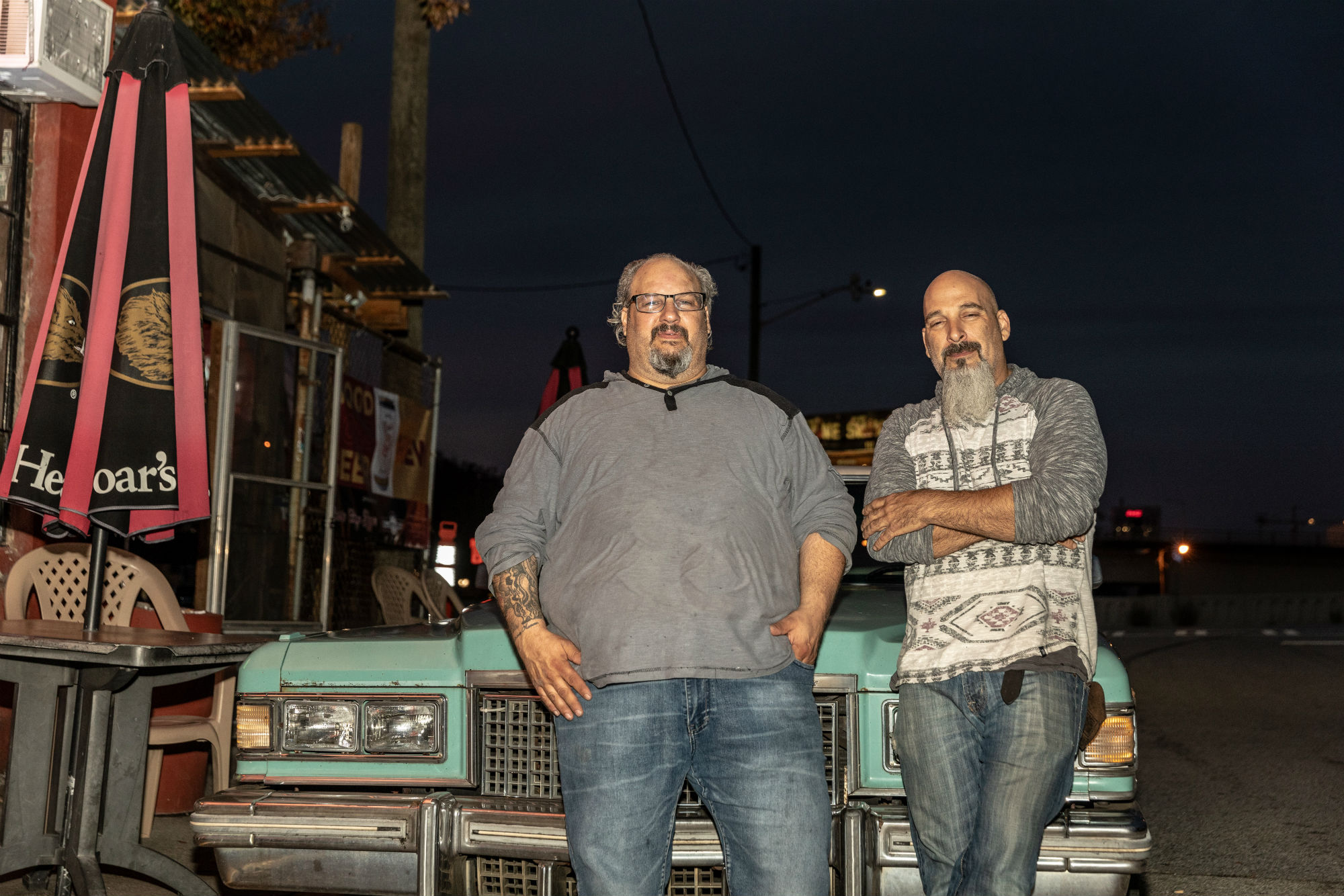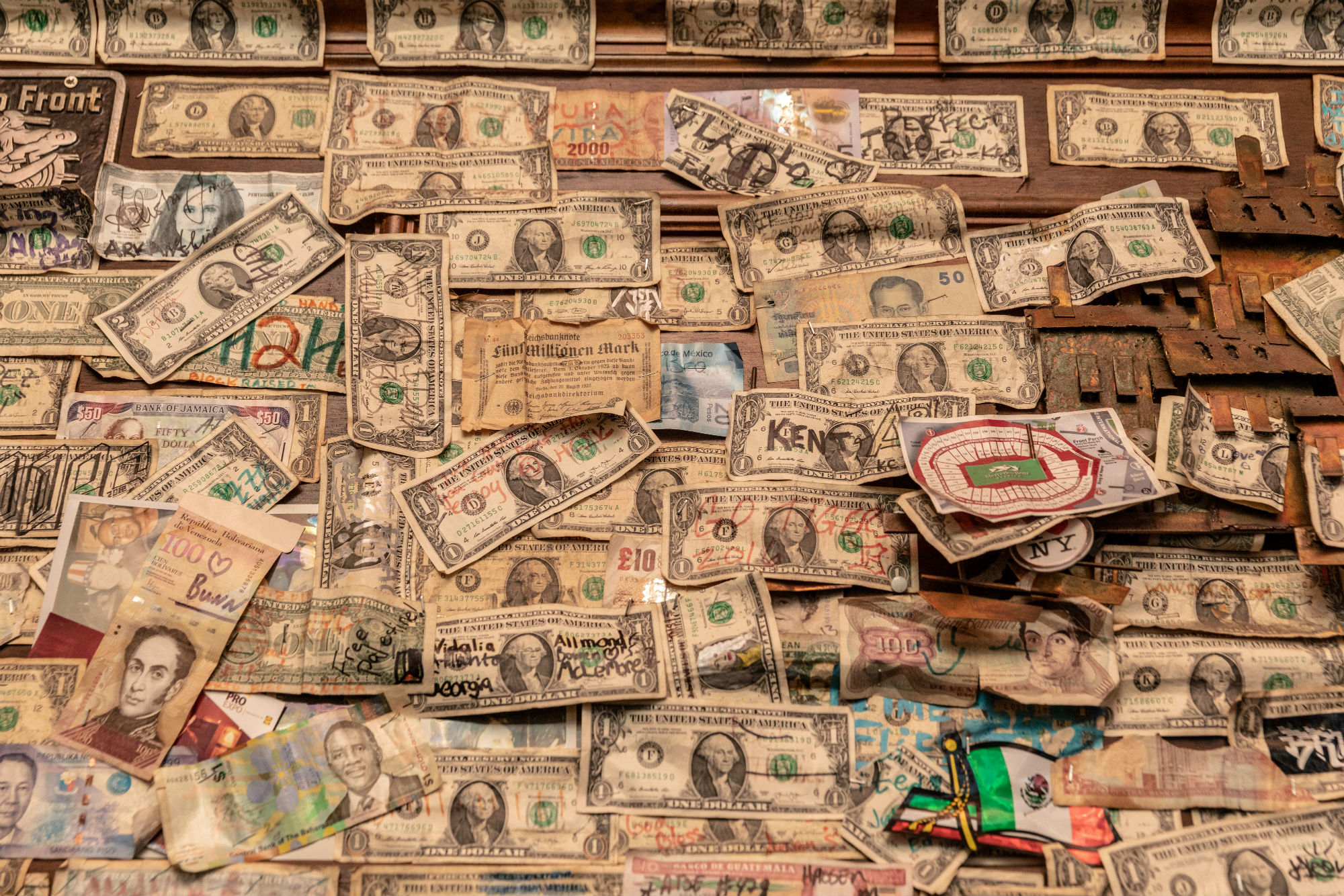In Deep Dive, VICE asks writers around the world to explain how their favorite bar represents their city’s history and culture.
The first time I got drunk at Elliott Street Pub, a ragtime band was playing in the street. Not on the sidewalk, or near the street, but out in the honest-to-Christ center of the pavement. It was April, the Atlanta air was already sticky-humid, and sweaty people clutching equally sweaty tallboys were drinking and dancing right on top of the double solid yellow lines. The scene felt a little post-apocalyptic—partly because there appeared to be no one and nothing else around, and partly because certain parts of this area were used as a convincing zombie apocalypse setting for, well, a reason. But mostly because, just yards away, the bridge linking the neighborhood to the rest of downtown Atlanta was gone.
Videos by VICE
If ever there were a quintessential visual representation of the Atlanta cityscape in the year 2018, Elliott Street—a tiny, unassuming, beloved neighborhood dive bar in a modest century-old building, standing in the shadow of the new $1.6 billion home of the Falcons and surrounded by near-constant development—might be it. The area around the bar has seen constant change over recent years, from the gutting and rebuilding of the bridge to the implosion of the nearby Georgia Dome to the construction of its replacement, Mercedes-Benz Stadium, whose futuristic glass panels loom just beyond the walls of the bar, which remain unchanged.

Maybe it’s the faded dollar bills papering the bar, or the mannequin dressed as a mermaid hanging over the entrance, or the sheer miracle that this hundred-year-old, nondescript building is even still standing in a city where such places are either merrily bulldozed or trussed up with reclaimed wood and a rebrand. But somehow, this is one of those bars that feels like it’s been there for centuries (or at least since the neighborhood’s anarchic Snake Nation days). Even I was initially surprised to learn that brothers Mike and Pete Jakob only opened it 13 years ago.
At 600 square feet, only about 30 people (including two to four bartenders) can squeeze into the minuscule pub at one time without violating the fire code, and there’s room for exactly 12 people to sit shoulder-to-shoulder at the bar. The bar’s interior is shellacked with a hodgepodge of random decor: an alligator head here, an old MARTA bus stop sign there—all of it miscellaneous detritus that their customers have dragged into the bar and presented to Mike and Pete over the years. One thing the brothers did seek out themselves? The jukebox, a stately 1971 Rock-Ola loaded with Sam Cooke, the Temptations, and the Commodores, situated next to the bar’s nuclear-orange Home Depot water dispenser. A single strand of red Christmas lights twinkles in the small window overhead.

The thing is, Mike and Pete, two construction workers who moved to Atlanta during the pre-Olympics building boom more than two decades ago, never set out to actually open a bar at all. The guys were just keeping an eye out for a place they, and their construction business, could call home. Their requirements were modest: a freestanding structure, and one without neighbors, where they could be loud.
In 2004, a late-night joyride on their bikes brought them into Castleberry Hill, and they found themselves in front of an abandoned century-old two-story building that had seen better days but still managed to check all the boxes. The property had once housed a nightclub on the Chitlin Circuit called Dee’s Bird Cage, but those glory days had long since passed: the roof was caving in, and the second floor was pockmarked with holes. “It looked like someone had tied chains around the windows and ripped them out,” Pete says. Fortunately, fixing those kinds of things happened to be the brothers’ shared forte. They bought the building for a song and started the long, hard, dirty work of rehabbing it themselves.
Though a bar didn’t figure into the brothers’ plan, that quickly changed, and they have an ancient Budweiser sign unearthed from the building’s nightclub days to blame for it. Pete says that one day, he and Mike were out ripping off the roof; as it happened, the Falcons were playing that afternoon, bringing hoards of Dome-bound pedestrians past the building—and the Budweiser sign. “A thousand people were walking by that sign, like, ‘Hey man, y’all gonna open up that bar?’ And after seeing that, we thought, you know what, maybe we will.”

Two years later, in 2006, the Jakob brothers did in fact open that bar. “We never planned on being here this long,” says Mike. He says they figured they’d try it for three or four years, then sell it and try something else, maybe move onto a boat. “Then they tore the bridge out,” Pete says of the main artery connecting Castleberry to downtown. “That’s when it all changed.”
After the bridge was gutted, the brothers knew they wouldn’t be able to sell the property any time soon. “We just had to adapt and overcome,” Mike tells me with a shrug. The brothers distributed flyers with printed directions to the bar. While waiting out the four-year project, they made the most of it, hosting block parties and bands in the middle of a road no one had any good reason to drive down anymore. Pete helmed the kitchen, and Elliott Street soon became known not only as a place to slug back a shot and a beer—it attracted a devout following for their sandwiches, piled high with deli meats and sent out of the kitchen wrapped carefully in brown waxed paper.

The bar took on a life of its own in the local arts community, too. The Jakob brothers hadn’t necessarily envisioned it as that kind of place, but when artists and musicians started hitting them up to host their projects at the space, they said yes to pretty much anything that seemed interesting. “It all happened organically,” Pete says. “Cool people found us, and then those people invited their people.” Suddenly, vats of molten iron were being poured outside every month, and the basement was hosting a roster of burlesque performers and jazz musicians. (It’s worth noting, prior to running the bar, neither Mike nor Pete ever listened to jazz—they’re more into hip-hop and reggae, says Pete.)
Throughout this, Atlanta’s cityscape continued shifting like sand dunes around them. Once the bridge was finally finished, then came the fall of the Dome and the rise of a new stadium. Recent years brought a steady cavalcade of construction workers into the bar; hardhats and neon vests became as much an Elliott Street fixture as High Life cans and shots of well whiskey. The ones working on the Benz became such loyal regulars that, when Mike’s dog Dutch passed away, they offered to bury him underneath the stadium’s 50-yard line. “Like Jimmy Hoffa,” Mike says, snickering. (He declined their offer.)

Yet, for all the bar’s weird decorative knick-knacks, cheap booze, and genuine cross-section of humanity assembling regularly in those dark, tight quarters, Mike and Pete don’t necessarily think of their place as a dive. “We think of it as a well-lit saloon,” Mike says with a gruff laugh. “Everybody calls it a dive bar, and they don’t mean that in a bad way… I think they just mean that anybody’s allowed here.” And by that measure, yes, Elliott Street most definitely checks out. “You can see guys here in a suit or a tennis dress,” Mike adds. He’s right: even on a quiet Wednesday afternoon, when much of nearby downtown is tethered to cubicles, the people straddling Elliott Street’s barstools include a grizzled biker in a weathered Harley-Davidson t-shirt, a woman in smart business-casual, leather-skinned men in highlighter-yellow safety vests, and a raspy-voiced little old lady, all huddled around the cramped bar over cheap drinks and deli sandwiches.
In the decade after that night I spent dancing in the street, practically everything surrounding Elliott Street either changed, or will soon—except the bar itself. Below that new bridge is The Gulch, a barren wasteland of asphalt beneath downtown’s elevated street system, from which a massive, multi-billion dollar development could potentially emerge. Nearby, a Hard Rock Hotel is in the works. Driving through Castleberry on my way home from the bar, I notice that an old fenced-in grassy lot alongside the railroad tracks where I used to let my dog run around is now a construction site. Yup: 115 new condos and townhomes, coming mid-2019.

As parts of Atlanta change almost beyond recognition, and as glass and steel fleck the city like a flesh-eating pox, and as more scrappy and beloved institutions are being priced out, places like Elliott Street have become even more of a rarity. The cache of trendy new bars and restaurants often look eerily similar, as though someone typed “what do urban millennials like to Instagram?” into an algorithm and brought the answer to life. Even the beloved Clermont Lounge, long touted as Atlanta’s preeminent seedy shithole, is now surrounded by the trappings of this New Atlanta, after a Nashville-based company bought the hotel above it and gave it a massive, Instagram-ready refurbishment. While the original basement strip club remains unchanged (and under separate ownership), there’s something a little less gritty about the experience knowing that just upstairs, people are eating foie gras and beef tartare.
And then there’s Elliott Street: a tiny, gritty, blue collar stronghold, stubbornly sticking it out as all that glass and steel encroaches, holding tight as though someone cast a forcefield around it long before “mixed-use” entered our collective vernacular. The kind of place that, if it came down to it, some people might lay down in front of a bulldozer for. Billions of dollars are getting pumped into the chase for all things shiny and new throughout the city. Hopefully the tattered dollar bills taped up inside Elliott Street will weather the storm.







Sign up for our newsletter to get the best of VICE delivered to your inbox daily.
Follow Gray Chapman on Twitter.




